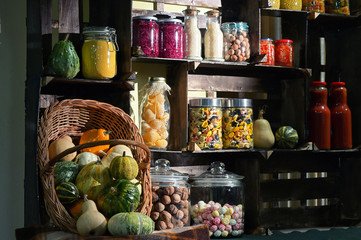
TRUMP SAYS: HUNTER MAKES FORTUNE FROM SHADY DEALS!
BIDEN FAMILY STINKS TO HIGH HEAVENS OF CORRUPTION!
DON'T GET LEFT OUT: HUNTER MUST BE STOPPED!

Emergency food preparation is sometimes stressful and overwhelming. But it doesn’t have to be! You also don’t have to eat the same things over and over again if you ever have to dig into your stored food. Which is why I wanted to share some often overlooked foods to consider adding to your food supply.
Having more options available to you will prevent boredom with food, and help round out your nutrient intake during an emergency situation.
3.Dehydrated Vegetables – Most of us already have at least some canned veggies in our stockpile. But you might want to consider adding some dehydrated vegetables as well. Dehydrated carrots, for example, can stay fresh for 20 years, and dehydrated corn can last for 10 years.
4. Dehydrated Meat (Jerky) – Jerky is not just a good travel snack, it’s also a tasty food fit for an emergency supply. Store-bought, processed jerky will last a long time to go bad in an unopened airtight container. If you’re adding it to your food supply, that’s how you should store it. Store-bought processed beef jerky will last one to two years easily in these conditions. If you make your own, it may only last three months, but you can increase this time by freezing it.
5. Oats – Rolled oats can last up to 30 years making them the perfect addition to an emergency food supply. Not only will they last when stored in airtight containers in cool, dry conditions, but they are incredibly inexpensive! They also provide carbohydrates for an emergency energy boost, iron, thiamine, and dietary fiber.
These are not the only overlooked foods preppers often pass by. If you have some suggestions, share them with our readers in the comment section so we can learn from each other.
With threats of an ever-spreading coronavirus and potential pandemic, and during the heart of winter when it’s possible to get snowed in, it never hurts to have some food on hand that you won’t mind eating and will get you through an emergency.
This article contains affiliate links.

It Took 22 Years to Get to This Point
The health "experts" are "on alert" after the first case of bird flu has been found in a child....
This article was originally published by John W. Whitehead and Nisha Whitehead at The Rutherford...
An elderly member of the Rothschild banking cartel dynasty is believed to have been killed in a...
Commenting Policy:
Some comments on this web site are automatically moderated through our Spam protection systems. Please be patient if your comment isn’t immediately available. We’re not trying to censor you, the system just wants to make sure you’re not a robot posting random spam.
This website thrives because of its community. While we support lively debates and understand that people get excited, frustrated or angry at times, we ask that the conversation remain civil. Racism, to include any religious affiliation, will not be tolerated on this site, including the disparagement of people in the comments section.


Boiling water will kill bacteria and most pathogens but some toxins are impervious to heat.
Is there like a stand alone water filter that will unequivocally filter toxins ?
The Mac Daddy of water filters?
Mine are all past due for replacement .
Would like to place an order today.
Thx.
Berkey…….read up on them…….excellent product
I trust my life to Katadyn. they have a gravity feed unit that makes a gallon per hour.
Dehydrated Vegetables suck! Get freeze dried instead or can your own. Also stock up on TVP of various varieties.
write a letter to ur states ag dept requesting a list of all the graineries in ur state. did that in Militiagan in the 90’s. 4 pages. if u live in the Mid-West, think Star of the West. LOTS of dried beans. toodles, T-1000.
I’d be surprised if rolled oats lasted 30 years. Generally the longest lasting are whole grains. Oat groats or otherwise known as unrolled or whole oats will last a long time, I believe around 10 years. Whole wheat and white rice will last 30 years even longer. If you are going to store oats, store whole oats and invest in a small manual oat roller to roll them fresh when you need them.
These never go bad:
Honey- will turn solid after time but just heat gently and it turns liquid again
Sugar
Salt
Twinkies- just had to add some comedy
Long term:
Dry beans
Dehydrated anything if its in a #10 can with oxygen absorber
Cans of Tang, lemonade, etc
Canned food- NOT if the cans are bulging. However, canned foods will loose texture and taste and the vitamins and minerals end up in the juices instead of actual product
Spam
Jars or cans of jalapeños
Pickles – most pickles are stored in vinegar
Olive oil – 2 years unopened in dry dark place
I always have a case of Sardines on hand. Even keep a can or 2 in each vehicle. Costco has them pretty reasonable.
Having a few 4 pound boxes of baking soda can be useful. Baking soda can be thrown onto a gas fire, which I witnessed my mother doing in a herculean effort, after I had left a glass coffee pot with a plastic handle on the stove, and forgot that I left it on the stove while packing to go to college. The stove naturally caught on fire when the plastic handle melted at 2:30 am.
It would be a safer alternative to fire blankets made out of asbestos, obviously messier, but not carcinogic. Asbestos is made out of calcium or magnesium ions woven into fabric. Everyone knows that calcium and magnesium are dietary essentials, so it is eveidently the fact that they are ions, which would be inhaled and act as free radicals.
An ionizing air filter would therefore probably be a bad idea.
There was a great web page on wikipedia about roof-top water harvesting. This is really a fantastic idea, if you live in a place where you can trust that people aren’t trying to poison you. Unfortunately, there are people that are willing to poison others with toxic water. Well poisoning as well as poisoning rice padies has been taking place for a very long time, which is where the phrase white on rice must come from. Rice has very high levels of arsenic, and should be rinsed at least 8 times in warm water. The white arsenic is released in the warm water, and the water will become visibly clearer with each rince. Brown rice has higher levels. Basmati and wild rice have lower levels of arsenic.
How about processed GMO foods, twinkies and other processed foods like Little Debbie cakes and cookies, real cocoa bars, coffee, tea, dried beans, rice, pasta etc.?